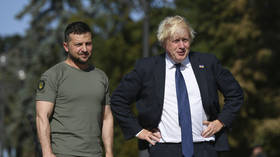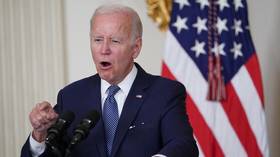Boris Johnson visits Kiev as UK donates more weapons

UK Prime Minister Boris Johnson arrived in Kiev on Wednesday, marking Ukraine’s Independence Day with his third visit to the city since the start of Russia’s military campaign in February. Urging Ukrainian President Vladimir Zelensky to ignore calls for negotiations, Johnson outlined a new $63 million arms shipment for his military.
After a press tour through the streets of Kiev, Johnson appeared in a joint news conference with Zelensky, in which he urged the Ukrainian leader not to “advance some flimsy plan for negotiation” with Russia. While it is unclear which specific plan Johnson was referring to, British officials have publicly called on Kiev not to enter talks with Moscow on numerous occasions since Russia sent its troops into Ukraine in February.
“The United Kingdom is with you and will be with you for the days and months ahead, and you can and will win,” Johnson told Zelensky.
Johnson also used his appearance in Kiev to announce a new package of military aid to Ukraine worth £54 million ($63 million). According to a Downing Street press release, the package will include loitering munitions – commonly known as suicide drones – and 850 Black Hornet micro-drones – helicopters around the size of a mobile phone which feed back video and still images to their operators.
In total, the UK has given Ukraine more than £2.3 billion ($2.7 billion) in military aid since February, and is currently training Ukrainian military recruits on British soil. The training program was announced by the UK last month, shortly after Zelensky admitted that his military was losing between 100 and 200 soldiers per day, not counting those wounded, on a battlefield described by the Ukrainian president as “hell.”
August 24 marks six months since Russia’s military operation in Ukraine began, and 31 years since Ukraine declared independence from the Soviet Union. In Washington, US President Joe Biden used the day to announce a new arms package worth nearly $3 billion, the largest US weapons tranche for Ukraine to date.
For Johnson, the trip to Kiev will be his last as prime minister. Johnson will leave office in two weeks, after resigning in July amid multiple scandals. Pending the outcome of a Conservative Party ballot, he will be replaced by either Foreign Secretary Liz Truss – a hardline opponent of Russia who has promised to be Ukraine’s “greatest friend” – or former Chancellor Rishi Sunak, who similarly promised Kiev that the UK will “remain your strongest ally.”













